Despite having no legal experience, Roy Bean was appointed a justice of the peace in Pecos County, Texas to help establish law and order there in the 19th century — and he did so in the most Wild West way imaginable.
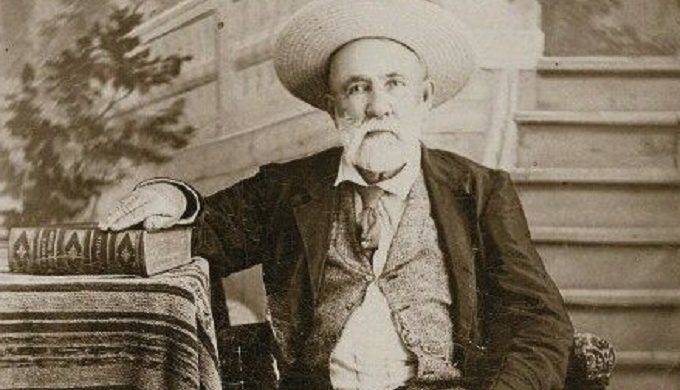
Wikimedia CommonsJudge Roy Bean, the only “Law West of the Pecos.”
In the late 1800s, Texas’ unruly Pecos County was overseen by a formidable but eccentric justice of the peace known as Judge Roy Bean.
Bean was an unusual choice for the position. Not only was he a saloon owner with no law experience whatsoever, but he was a former outlaw known to have killed multiple men himself.
Bean carried out his duties in true Wild Fest fashion, holding court in his saloon and using a .41 Smith & Wesson gun as a gavel. Throughout his long career, he became known for his bizarre verdicts, his penchant for pocketing the fines he charged in court, and his lifelong passion for the actress Lillie Langtry.
And even though Bean had a reputation as a ruthless “hanging judge,” he never actually hanged anyone. In fact, in his younger years, he was nearly hanged for murder himself — and reportedly carried the rope scars for the rest of his life.
This is the incredible story of Judge Roy Bean, one of the most legendary figures of Texas’ Wild West.
A Bloody Early Life
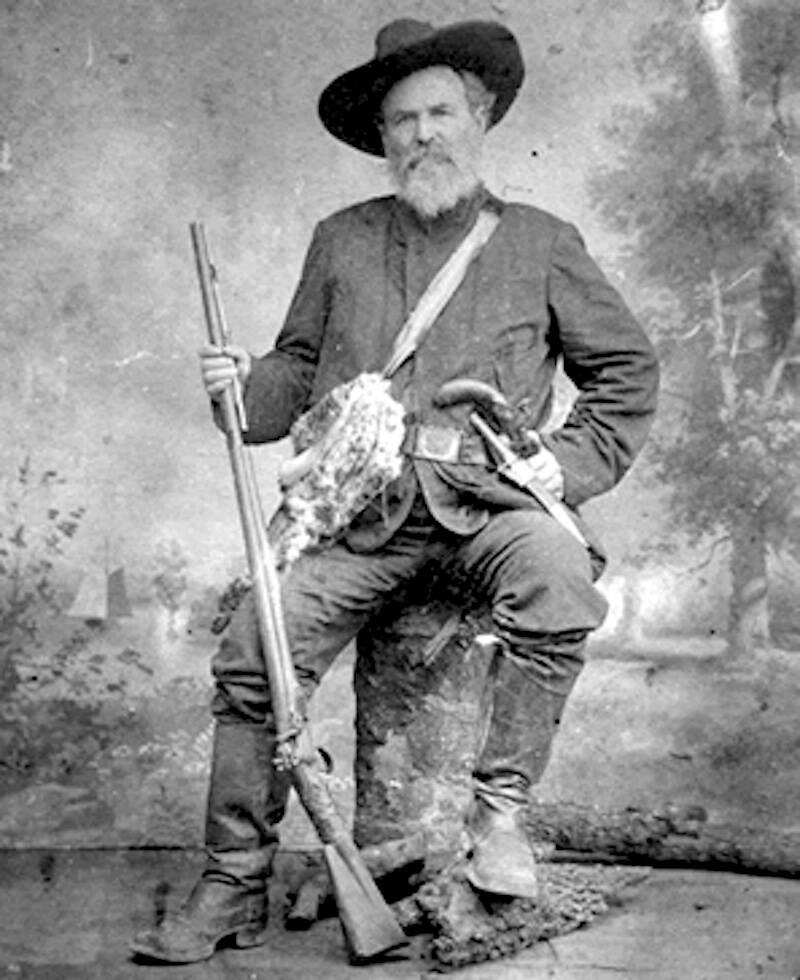
Public DomainWhen he was younger, Roy Bean fought in a number of duels and shot and killed multiple men.
Records of Judge Roy Bean’s childhood are murky. Some sources say he was born Phantly Roy Bean in Kentucky in the 1820s; others say he was born in 1835. Regardless, historians agree that Bean came from a poor family and had a rather rough adolescence.
In the late 1840s, Bean followed his older brother, Sam, out to Mexico, where they operated a trading post. Roy frequently got into fights, and after shooting a man in a bar brawl, he eventually had to flee to California; there, his other brother Josh owned a saloon and taught Roy how to run a bar.
However, old habits die hard. In California, Roy Bean got involved in a number of duels, often over the affections of women, with whom Bean was reportedly very popular.
Eventually, Bean got into real trouble when he shot and killed a Mexican officer over a woman. A mob of the officer’s enraged friends went after Bean and attempted to hang him. Luckily, the rope stretched, allowing Bean enough time to cling to life while the woman he’d fought for cut him down, saving him.
The rope scars around Bean’s neck remained with him for the rest of his life, providing a lasting reminder of what it feels like to face the gallows.
Roy Bean’s Journey To The Pecos
Effectively run out of California, Roy Bean moved east, where he managed to establish a relatively stable life for himself in Texas. Bean became a prosperous businessman in San Antonio for 16 years, working at times as a saloon keeper, a freighter, and a dairyman. He married María Anastacia Virginia Chávez in 1866, and together they had four children.
However, Bean soon learned that new railroads were being laid out across West Texas, and that construction camps were cropping up along the tracks. Seeing a business opportunity, he left his wife and children and headed westward in 1882 to seek his fortune.
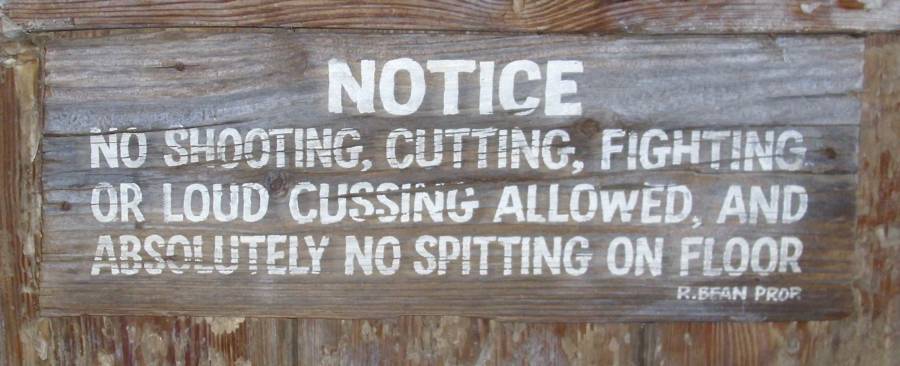
Wikimedia CommonsA sign posted outside of the present-day Jersey Lilly saloon in Langtry, Texas. The building is a faithful replica of the original.
Bean settled down in the town of Langtry in what is now Val Verde County, near where the Rio Grande meets the Pecos River. There, he opened a saloon and served whiskey to railroad workers, and later to the people who would come in on the new train line. He named his saloon “Jersey Lilly” after the beautiful actress Lillie Langtry, for whom Bean harbored a deep, lifelong obsession.
It was here that Judge Roy Bean would truly make a name for himself.
Becoming A Justice Of The Peace In West Texas
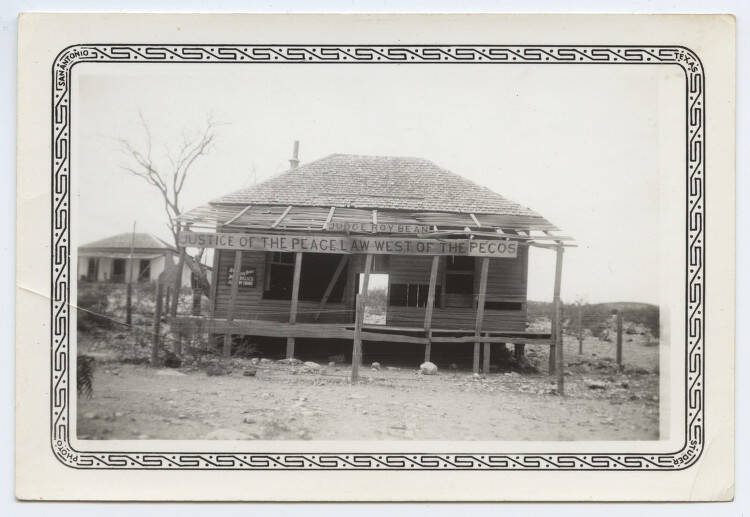
Wikimedia CommonsThe Jersey Lilly saloon, where Roy Bean held court.
During the late 19th century, Texas needed lawmen to help tame the Wild West. So in August 1882, Pecos County commissioners appointed Roy Bean justice of the peace — even though he had no previous legal experience.
In true Wild West fashion, Bean held court sessions in the saloon, where he served drinks to jurors during recess. According to Texas Standard, he relied entirely on a single law book, an 1879 edition of Revised Statutes of Texas, and burned all of the other books the legislature sent him.
This may explain why Judge Roy Bean made so many unorthodox and at times outrageous rulings. In one case, he threatened to hang a lawyer for using profane language — after the lawyer said “habeas corpus.”
He even once fined a dead man $40 for carrying a concealed weapon. But while this verdict may seem odd, the money was used to cover the man’s funeral. Bean did, however, confiscate the gun in question, which he then reportedly used as a gavel.
Perhaps Bean’s most outrageous moment came during a murder trial. An Irishman was accused of killing a Chinese railroad worker. According to the El Paso Daily Herald, Bean let the Irishman go on the grounds that “there is no law against killing a Chinaman.”
A blunt, abrasive, formidable, and eccentric magistrate, Roy Bean took to proudly calling himself the “Law West of the Pecos,” and even wrote the moniker on a sign outside his saloon.
The Hanging Judge Who Never Hanged Anyone
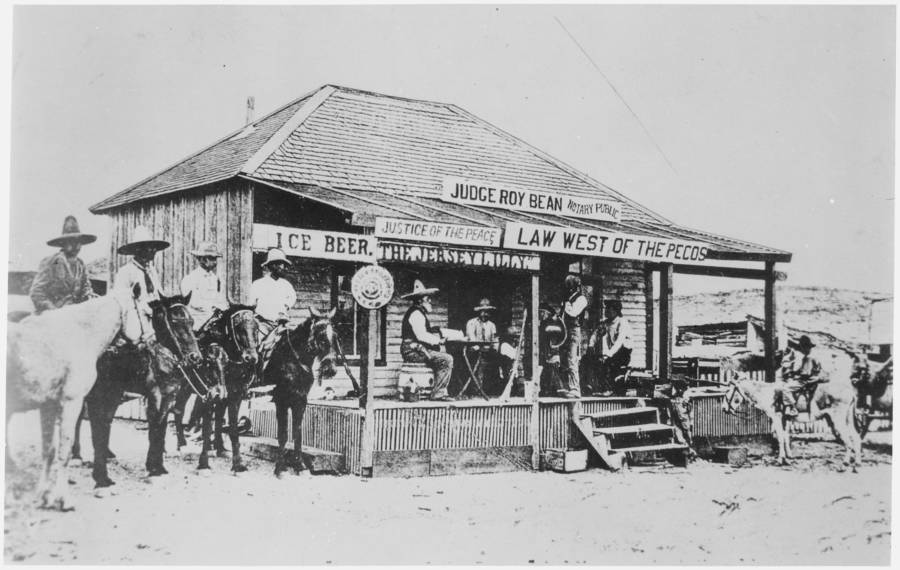
Wikimedia Commons The courthouse of Judge Roy Bean, circa 1900.
Judge Roy Bean’s rulings became the stuff of legend to the point where many rumors circulated that he was a “hanging judge” fond of sentencing convicts to death. Bean actually encouraged these rumors, touting the motto, “Hang ’em first and try ’em later.”
It’s possible that these rumors started because people often mistook Bean for Isaac Parker of Fort Smith, Arkansas. Parker actually was a hanging judge who sentenced around 160 people to death.
But in reality, Bean never hanged anyone — though he did on occasion stage fake hangings to scare outlaws into becoming law-abiding citizens. After sentencing these men to death, he would then give them the chance to “escape.” After Judge Roy Bean scared them straight, they typically never caused trouble in Langtry ever again.
Most of the cases Bean oversaw in his nearly 20 years as a judge were simple misdemeanors. And because there was no jail in Langtry, cases were typically settled with fines — which Bean reportedly pocketed
The Secret Soft Side Of Roy Bean
In public, Judge Roy Bean had a reputation as a rogue, an eccentric, and a bigot who spent most of his time drinking or meting out harsh sentences. But behind the scenes, Bean had a soft side.
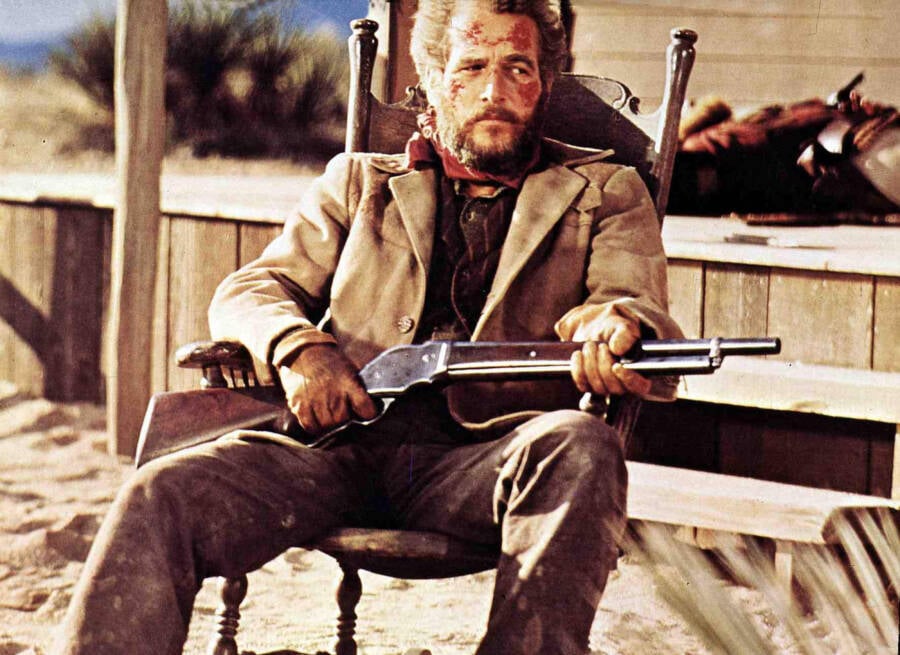
United Archives GmbH / Alamy Stock PhotoPaul Newman played Bean in the 1972 film The Life and Times of Judge Roy Bean.
He was reportedly so in love with Lilly Langtry that he even wrote to her inviting her to visit the town, telling her he’d named it after her. (This was a lie. Texas Highways reports that the town of Langtry was actually named for a Southern Pacific engineer, though it’s true that Bean’s saloon was named for the actress,)
He also cared deeply for his community and quietly used his position to help the less fortunate. For example, as penance for peoples’ crimes, Bean often put them to work performing odd jobs in Langtry as community service, according to Texas Escapes.
He also often used the fines he charged in court to help the poor, spent the profits from his saloon to buy medicine for the sick and destitute of Langtry, and bought Christmas presents for neighborhood children.
Despite his unorthodox style, Judge Roy Bean was re-elected justice of the peace time and again, almost every year until his last election in 1902. He died in his bed in Langtry on March 16, 1903, after falling ill in San Antonio.
In a sad twist, Lillie Langtry finally visited the town in 1904, after the judge’s death. She was about ten months too late.
After learning the story of Judge Roy Bean, read about Butch Cassidy, the Robin Hood of the Wild West. Then, see what life was really like in the Wild West with these 44 photos.





